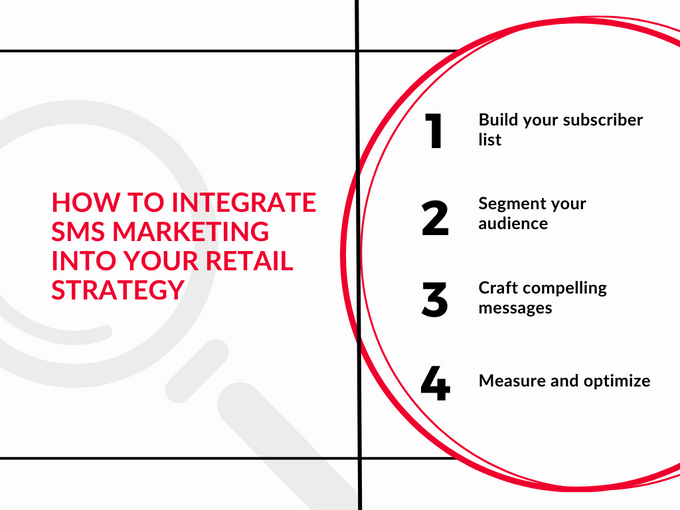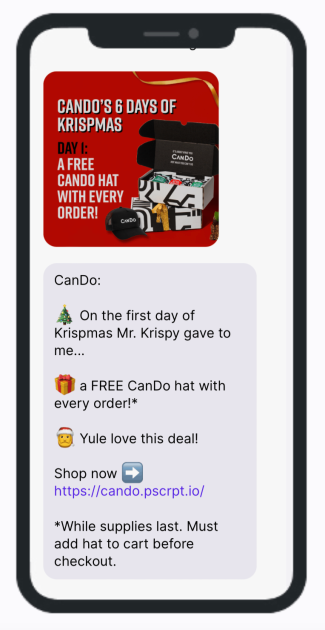How to Integrate SMS Marketing Into Your Retail Strategy
With the right strategy, SMS marketing can be one of the best tools in retail.
Updated October 29, 2024.

Are SMS messages outdated? With all the AI algorithms, snazzy email templates, and social media ads, you might think so.
But here’s the thing: SMS marketing is still going strong. In fact, with AI getting better at personalization, we could be on the brink of a new era—let’s call it SMS Marketing 2.0.
So why is SMS marketing so important in eCommerce? How do you build a solid SMS strategy? And how do you write messages that your customers will love? Let’s find out.
Meet the Expert
Arjel Vajvoda, Head of Product at Motomtech, leverages her extensive experience in customer support to craft user-focused SaaS products with innovative documentation solutions.
Why Use SMS Marketing in Retail?
SMS marketing is a powerful tool that complements other channels in your marketing mix. It’s not about replacing email or social media marketing, but about using SMS to enhance these strategies. After all, when it comes to metrics, SMS marketing has a few advantages over other digital channels.
- Visibility: SMS messages have an open rate of 98%, meaning your message is almost guaranteed to be seen.
- Speed: Most people read their texts within minutes of receiving them, making SMS perfect for time-sensitive information.
- Engagement: The average click-through rate for marketing texts is between 5% and 10%; email marketing typically sees between 3% to 5%.
- Personalization: Retailers use SMS marketing to engage in two-way conversations with customers and offer personalized product recommendations. A direct line of communication fosters stronger relationships and boosts customer satisfaction.
» Want to focus on just one marketing channel? Find out if you should choose email or SMS marketing.
How to Integrate SMS Marketing Into Your Retail Strategy
1. Build Your Subscriber List
Start by creating a subscriber list. Remember, you need your customers’ explicit consent to send them SMS messages. You can promote SMS subscriptions on your website, email newsletters, social media, and even in-store signage.
Make it easy for customers to opt in by using keywords. Offer incentives to encourage sign-ups. And always be clear about what they’re signing up for—how often they’ll receive messages and what kind of content they can expect.
2. Segment Your Audience
Once you have your subscriber list, it’s time to segment your audience. Group your customers based on shared characteristics like:
- Purchase history
- Browsing behavior
- Location
Tailored messaging leads to higher engagement and conversion rates.
3. Craft Compelling Messages
Your SMS messages should be clear, concise, and engaging. Use action words and include a strong call to action. Check out this example from CanDo, which presents its message in a punchy, friendly, and engaging way.
Here are some key tips to consider when crafting your SMS messages.
- Play by the Rules: Always get clear consent before sending promotional texts. And make sure it’s easy for people to opt out.
- Keep it Short: SMS messages have a limit. So, get to the point. Keep your messages short and sweet, and avoid spammy content.
- Be Clear and Actionable: Your message should be easy to understand and include a clear call to action. For example, “Flash Sale: 50% off all items until midnight! Shop now at [link]”.
- Make it Personal: Personalization is a great converter. Use your customer data to make your messages more relevant and boost response rates. Tailor your message to the recipient’s interests or past behavior. This makes your message more relevant and engaging.
- Time it Right: Send your messages at the right time. Consider when your offer is valid and what time zone your recipient is in. No one likes to be woken up by a text in the middle of the night.
» Want to boost sales further? Learn where to personalize your store.
4. Measure and Optimize
Continuously monitor and measure the performance of your SMS campaigns.
Set KPIs and track metrics like click-through rates and conversions to gain insights and optimize future campaigns for better results.
Example
Handheld Handmade built its entire business model around SMS marketing.
When customers sign up for its text messages, they fill out a questionnaire. This helps Handheld Handmade create super-personalized SMS campaigns.
These campaigns are tailored to the customers’ preferences. They take into account when customers want to receive messages, their budget, and the types of products they’re interested in.
And all transactions happen right in the customer’s text messaging app. This makes shopping easy.
Tools and Platforms to Implement SMS Marketing
SMS marketing is easier with the right tools. Here are a few you can use:
- Fast Simon: Our platform leverages AI to create personalized marketing campaigns. It ensures the right messages reach the right customers at the right time, enhancing customer experience and engagement. Fast Simon also integrates well with your existing CRM or marketing automation platforms, keeping your subscriber data up-to-date.
- Shopify: Offers tools for SMS marketing within its platform, making it a convenient choice for retailers using Shopify for e-commerce.
- Klaviyo: Advanced AI segmentation and personalization capabilities, along with intent-based flows. Highly efficient SMS and email marketing tool for abandoned cart recovery.
- Attentive: Relevant SMS adverts and powerful retargeting based on the last session. Paired with Fast Simon, the tool segments the audience according to detailed events.
- Textline: Seamless integration with other marketing tools for an omnichannel strategy. Can run flash sales, personalized offers, and customer support via SMS.
- EZ Texting: Features segmenting audiences, scheduling texts, and tracking campaign performance. It's also user-friendly and suitable for various levels of SMS marketing expertise.
» Looking for more tools? Check out the best eCommerce personalization software solutions.
SMS Marketing Compliance and Technical Considerations
Let’s talk about the technical side of SMS marketing and why it’s important to stay compliant.
First, make sure your SMS messages play nice with your existing CRM or marketing automation platforms. This keeps your subscriber data up-to-date and lets you send messages based on actions and behaviors.
Next, choose a reputable SMS provider. They should have good relationships with carriers and stick to industry standards. This helps avoid any issues with delivering your messages.
Lastly, your SMS marketing needs to follow certain laws and regulations:
- Consumer Protection Act: Regulates commercial text messages to mobile devices. You need to get clear consent before sending SMS messages and always provide an opt-out option.
- General Data Protection Regulation (GDPR): If you’re operating in or targeting customers in the EU, you need to get clear consent for data processing and be transparent about how you use customer data.
- Telephone Consumer Protection Act (TCPA): This law also requires consent and sets specific rules for contacting consumers via SMS. And be warned, there are fines for not complying.
» Find out how to collect eCommerce data ethically.
SMS Success and Beyond
In SMS marketing, getting customer consent and personalizing messages are key. Make sure customers have clearly opted in for your SMS marketing. Then, shape your messages based on their preferences and past behaviors. This not only meets regulations but also boosts customer experience and engagement.
Remember, SMS marketing isn’t just about sending out promotions. It’s a way to build and maintain customer relationships.
Your SMS campaigns should be part of a wider customer engagement strategy. That way, your messages add value and link up with your other digital channels
» Learn more about the AI-based tools for email and SMS marketing.







